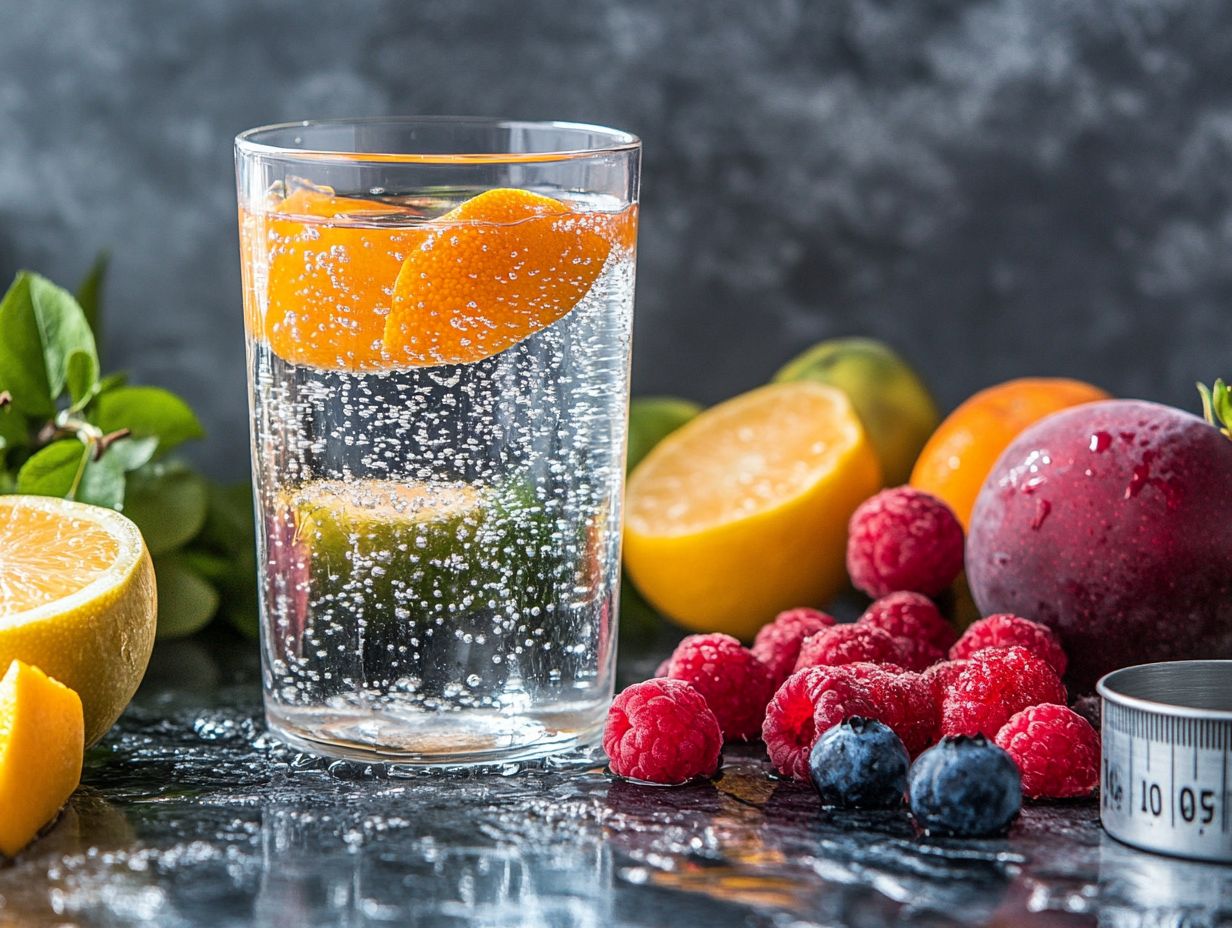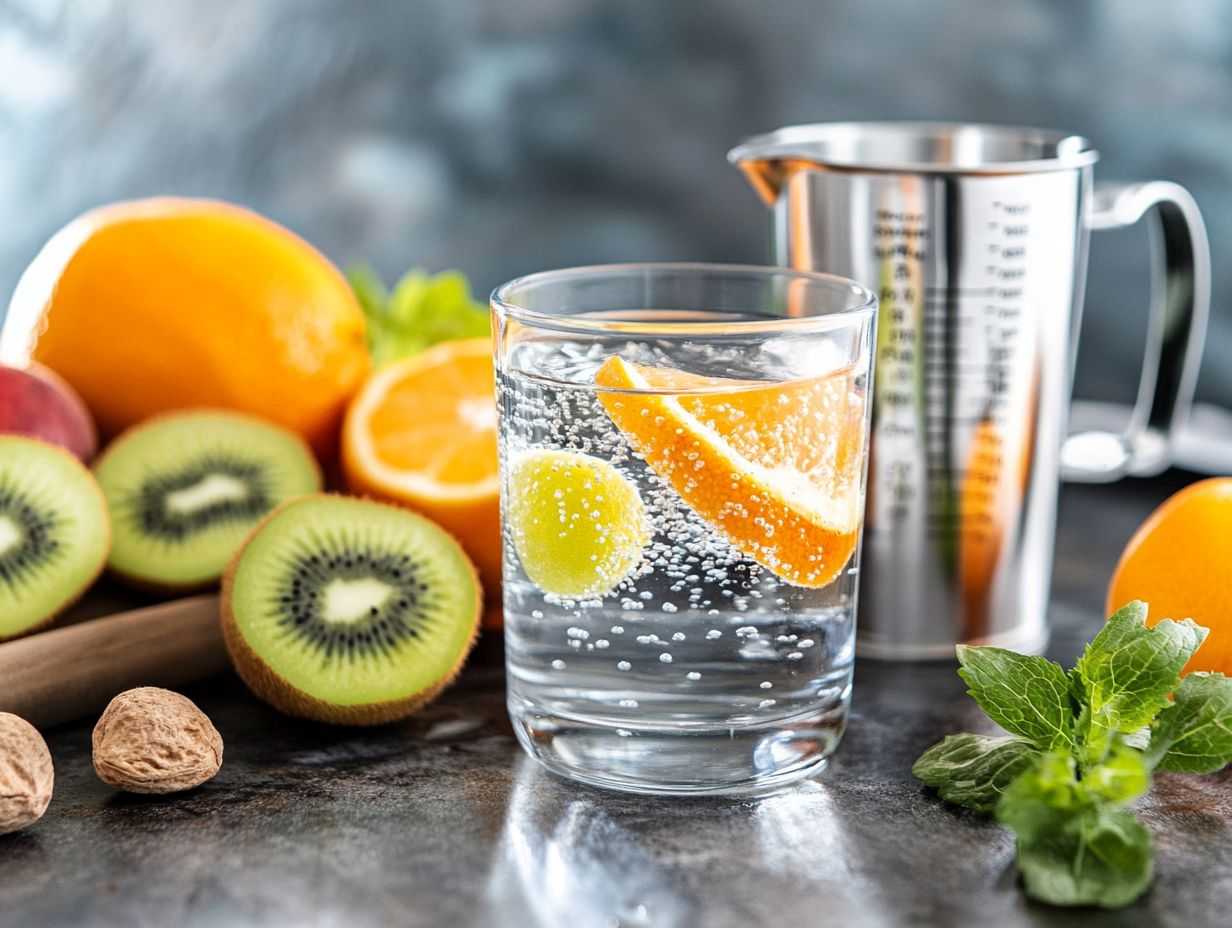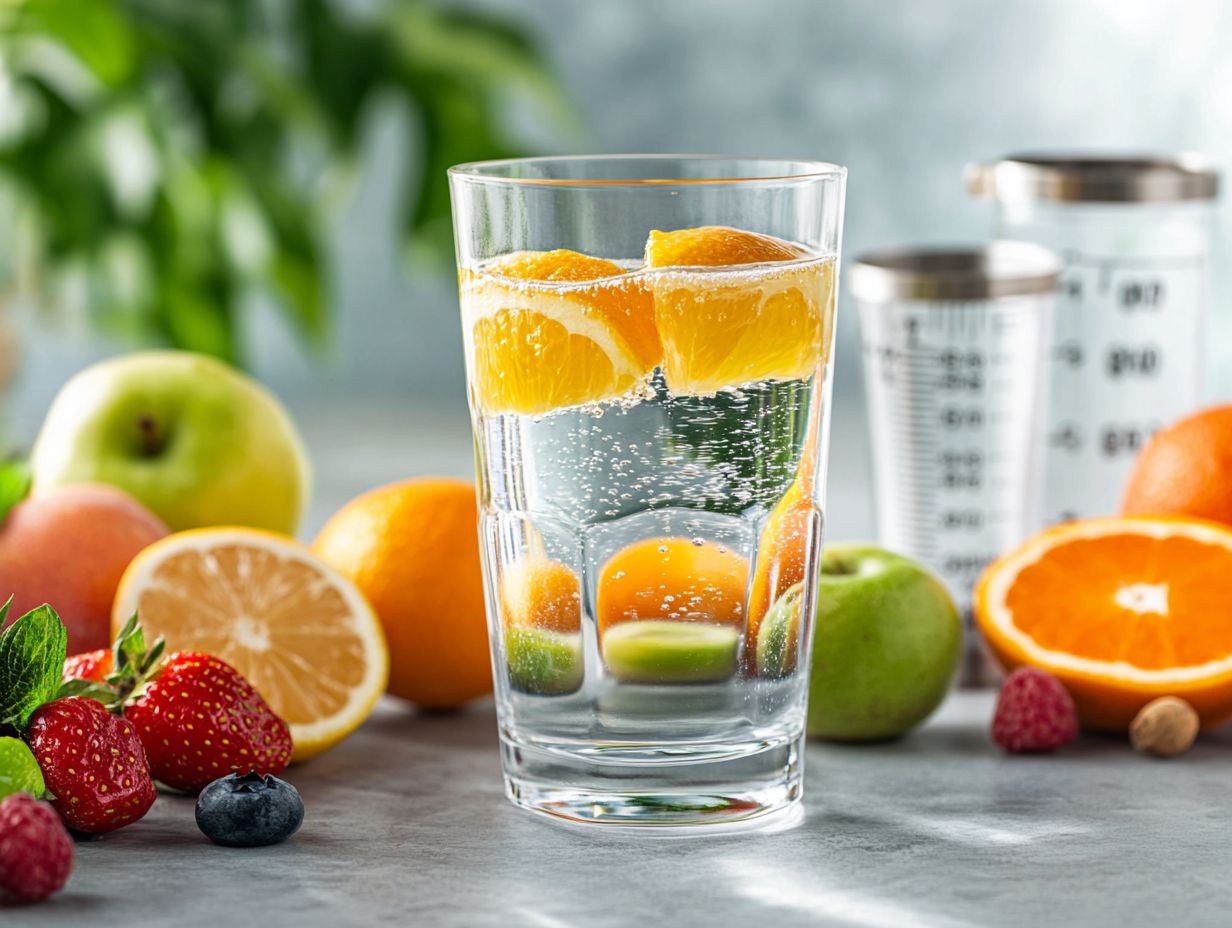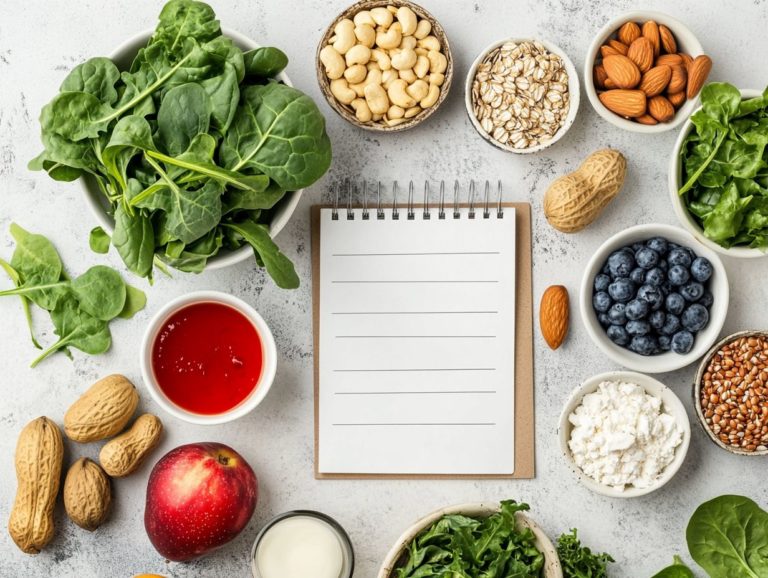The Importance of Hydration: How Much Water Do You Need?
Water is vital for nearly every function in the human body. Yet, many people overlook the significance of staying properly hydrated.
This exploration delves into why hydration is essential for your health. Learn to spot the signs of dehydration so you can stay on top of your health! It also shares effective tips to keep you hydrated and highlights the specific hydration needs of children, pregnant women, and seniors.
Engage in understanding how to maintain optimal hydration for a healthier life.
Contents
Key Takeaways:
- Staying hydrated is crucial for maintaining overall health and well-being.
- The recommended daily water intake varies based on factors such as age, activity level, and climate.
- Recognizing the signs of dehydration is crucial for your health act quickly! Thirst, dry mouth, and fatigue are key indicators.

The Role of Water in the Body
Water is essential for maintaining your overall health and wellness. It serves as a vital fluid necessary for numerous bodily functions, including digestion, nutrient transport, and temperature regulation.
The Institute of Medicine emphasizes that drinking enough water is crucial for optimal health. Your body is composed of roughly 60% water, which is essential for joint lubrication and maintaining the right amount of salts in your body.
Drinking enough water significantly impacts how your body responds to physical activity. It helps to prevent dehydration and supports numerous health benefits across all age groups.
Why Hydration is Essential for Health
Hydration is essential for your health. It directly influences vital bodily functions and helps to prevent dehydration, which can lead to serious health issues.
Keeping your body adequately hydrated promotes optimal circulation, digestion, and temperature regulation key elements for maintaining overall well-being. For example, studies show that insufficient water intake can worsen conditions like diabetes, where proper hydration is crucial for regulating blood sugar levels.
If you have chronic kidney disease, the risks of deterioration increase when dehydrated. A balanced fluid intake supports normal kidney function.
Research shows that even mild dehydration can impact cognitive performance and mood. Maintaining proper hydration isn t merely a preference; it’s a vital component of your health that influences various systems within your body.
Recommended Daily Water Intake
Your recommended daily water intake can vary considerably based on several factors, such as your age, sex, activity level, and climate.
Generally, it s suggested that adults aim for around 2.7 liters of water daily for women and 3.7 liters for men. This is essential for maintaining optimal hydration and reaping the numerous health benefits that come with it.
Factors That Affect Water Needs
Several factors, such as your age, health conditions, and even the effects of caffeine, can significantly influence your water needs. This makes it crucial to assess your personal hydration requirements.
For example, infants and young children have higher hydration needs relative to their body weight due to their rapid metabolic rates. On the other hand, seniors may be more susceptible to dehydration, as their body s sense of thirst tends to diminish with age.
Specific health conditions can further complicate your hydration needs. If you have heart failure, you might need to restrict fluid intake to avoid putting extra strain on your heart. Managing fluid intake is also essential for diabetics to support overall health.
Beverages like coffee and tea, which contain caffeine, can act as diuretics. Excessive consumption may lead to increased urination and potentially impact your hydration levels. By understanding these factors, you can effectively manage your personal hydration needs.
Start hydrating today to boost your health! Grab a glass of water now!
Signs of Dehydration

Recognizing the signs of dehydration is essential for your well-being. Early intervention can prevent complications and maintain optimal hydration.
Pay attention to common indicators such as thirst, a dry mouth, fatigue, and dark urine. Being proactive in addressing these signals can make all the difference in keeping your body properly hydrated.
Recognizing When You’re Not Drinking Enough
Being aware of the signs that indicate you re not drinking enough can be a game changer. This awareness allows you to take timely action to boost your hydration levels and prevent dehydration and its related health issues.
These signs can manifest in various ways think persistent fatigue, dry skin, or annoying frequent headaches. They may seem subtle, but they are significant indicators that your body is craving more fluids.
Recognizing these symptoms early is essential. Prolonged dehydration can lead to serious complications, such as kidney stones or urinary infections.
A practical tip for keeping an eye on your hydration status is to monitor the color of your urine. A light yellow hue typically signals that you re well-hydrated, while darker shades suggest it s time to indulge in a refreshing drink.
Regular reminders throughout your day to drink water can help reinforce consistent hydration habits, promoting your overall health.
Ways to Stay Hydrated
Staying hydrated is a seamless endeavor that can be effortlessly woven into your daily routine. Consider drinking plenty of water throughout the day, enjoying fruits and vegetables with high water content, and opting for healthy beverages instead of sugary drinks!
By embracing these simple strategies, you can elevate your hydration game and enhance your overall well-being.
Tips for Meeting Your Daily Water Needs
Implementing a few simple hydration tips can significantly enhance your ability to meet daily water needs, ensuring optimal hydration and a wealth of health benefits.
Carrying a reusable water bottle is a smart move it makes drinking water more convenient and fosters a habit of regular hydration throughout your day. Setting reminders through handy smartphone apps or calendar alerts can further encourage consistent water intake.
Incorporating herbal teas into your routine is another excellent strategy; they add flavor and variety, making the act of staying hydrated feel less like a chore. Research from the Harvard T.H. Chan School of Public Health underscores the importance of maintaining adequate fluid levels, revealing that doing so can positively impact energy levels and cognitive function.
Embracing these hydration strategies is not just beneficial; it’s essential for your overall health.
Importance of Hydration During Exercise
The significance of hydration during exercise is paramount; it goes beyond mere comfort. Staying well-hydrated not only helps regulate your body temperature but also plays an essential role in preventing dehydration, ensuring you perform at your best.
Prioritizing hydration is key to unlocking your full potential during any workout. Don t wait stay hydrated now!
How to Hydrate Properly During Physical Activity

To hydrate properly during physical activity, it s essential for you to know how much water you need based on the intensity and duration of your exercise, as well as the environmental factors at play.
A well-planned hydration strategy should account for how long and hard you are exercising, as well as the temperature and humidity levels around you. For shorter sessions, simply drinking water might do the trick. However, during prolonged or intense workouts especially in hot conditions opting for sports drinks that replenish electrolytes (minerals that help maintain fluid balance) can offer greater benefits.
It s advisable to pre-hydrate before you begin your workout by drinking water about 2-3 hours in advance, and then taking small sips throughout the session. Staying attuned to your exertion levels is crucial; if you notice signs of thirst or dark urine, it s a clear indication that you need to increase your fluid intake to maintain optimal performance and recovery.
Start tracking your water intake today for better health!
Hydration for Specific Groups
Hydration needs fluctuate considerably among various demographic groups. Understanding the specific water requirements for infants, pregnant women, and seniors is essential.
Recognizing these unique hydration needs is vital for ensuring that each group maintains adequate hydration for optimal health and well-being.
Water Needs for Children, Pregnant Women, and Seniors
Water needs vary greatly among children, pregnant women, and seniors. Tailored hydration strategies that address their unique health conditions and requirements are essential.
For children, a higher fluid intake relative to their body size is crucial to support their growth and active lifestyles. Dehydration can significantly impact their development and cognitive function. Keeping them well-hydrated is important.
Pregnant women have heightened hydration needs. Staying properly hydrated helps provide adequate amniotic fluid, the fluid that surrounds the baby in the womb, and supports the growing fetus. It s vital for them to drink enough water throughout the day.
Seniors often feel less thirsty and may face various medical conditions, making them particularly susceptible to dehydration. This can lead to complications such as heat-related illnesses or urinary tract infections. Therefore, they must be vigilant about their hydration.
By ensuring each group understands their specific hydration needs, you can significantly enhance overall well-being.
Frequently Asked Questions
Do you know the signs of dehydration? Here s how staying hydrated can help!

Signs of dehydration include thirst, dry mouth, fatigue, dizziness, and dark-colored urine. Drinking enough water can prevent these symptoms and keep your body functioning properly. Remember, by the time you feel thirsty, you may already be slightly dehydrated.
What are some benefits of staying hydrated?
Staying hydrated has numerous benefits, such as improving skin health, aiding in digestion, boosting energy levels, and promoting weight loss. It also helps with brain function, mood regulation, and overall physical performance.
Can you get enough water from other sources besides drinking it?
While drinking water is the most effective way to stay hydrated, you can also get water from fruits and vegetables, soups, and even coffee and tea. However, these sources may contain other substances that can negatively affect hydration, so it’s important to still prioritize drinking water.
How does dehydration affect athletic performance?
Dehydration can significantly impact athletic performance by causing fatigue, muscle cramps, decreased coordination, and decreased endurance. Athletes must stay properly hydrated before, during, and after physical activity to avoid these negative effects.
What are some tips for staying hydrated throughout the day?
Some tips for staying hydrated include:
- Carrying a water bottle with you at all times.
- Setting reminders to drink water throughout the day.
- Flavoring your water with fruit or herbs for added taste.
- Opting for water over sugary drinks.
Also, remember that the more active you are, the more water you’ll need to drink to stay hydrated.
Make drinking water a part of your daily routine! Take a moment to drink a glass of water now your body will thank you!






